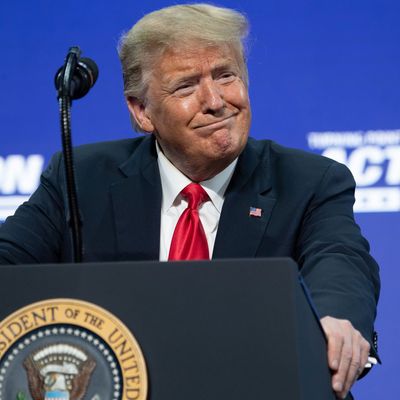
The novel coronavirus has put Donald Trump’s reelection campaign on life support.
In late February, America’s unemployment rate was at a half-century low, consumer confidence was high, and betting markets were bullish on Trump’s odds of a second term. Four months and 123,000 U.S. coronavirus deaths later, times have changed. Before COVID-19 made its presence in the U.S. felt, Joe Biden led the president by roughly five points in national polls. Today — with tens of millions unemployed, and Houston’s ICUs running out of capacity — the Democrat leads Trump by more than ten.
Like other leaders in afflicted countries, Trump enjoyed a brief polling boost at the onset of the pandemic. But this “rally around the flag” effect started dissipating in early April. The White House ostensibly attributed its declining numbers to the economic consequences of lockdown, rather than the public-health catastrophe it had failed to prevent. Thus, the administration pressured states to expedite reopening, while Trump trumpeted an unproven antimalarial drug as a COVID-19 elixir. In response to these actions, many accused the president of crassly prioritizing his reelection above Americans’ health and safety. This was a plausible critique at the time. But as an assessment of Trump’s handling of the pandemic in recent days, it is actually too generous.
At this point, it is quite clear that Donald Trump’s interest in keeping his job — and the American public’s interest in minimizing the spread of the coronavirus — are perfectly aligned. Formal restrictions on economic activity have been relaxed throughout most of the country. The force that’s holding down the economy (and the president’s poll numbers) is not lockdown orders; it’s the uncontrolled spread of a deadly virus. The more Trump does to curb COVID-19, the better his odds of getting back into contention. Recent polling from the (Democrat-aligned) Global Strategy Group indicates that the voting public is paying close attention to coronavirus case counts. For once, objective facts about a pressing policy challenge are politically salient. Trump can become a more popular president by doing a better job.
But for Donald J. Trump, some things are more important than winning an election — and spreading the novel coronavirus is ostensibly one of them.
One of the most effective — and least economically compromising — ways to contain the pandemic is to encourage universal mask-wearing in public indoor spaces. Instead, Trump has derided masks as both ineffective and anti-conservative. Which is to say: He has actively discouraged his supporters from wearing masks, even as poll after poll shows upward of 70 percent of Americans supporting mask-wearing in public.
Surveys also show that the American public overwhelmingly supports widespread coronavirus testing. And yet, Trump has said that he told his people to “slow down the testing” because it was uncovering too many new cases. After administration officials tried to pass this off as a joke, Trump clarified that he was entirely serious. The White House then confirmed Trump’s sincerity by cutting off federal funding to 13 COVID-19 testing sites, including seven in Texas where a “massive virus outbreak” is currently sweeping the state. Marginally reducing testing capacity will make it harder for states and cities to respond to nascent outbreaks by tightening social-distancing protocols or preparing hospital systems for higher ICU demand. But it won’t do much to disguise the ongoing existence of a public-health crisis.
Most egregiously, Trump has been traveling to coronavirus hotspots across the country, and has ostensibly been trying to orchestrate superspreader events. On Tuesday, the president went to Arizona — where new cases of coronavirus have been growing at a clip of 3,000 a day — and convened a large indoor rally before a mostly unmasked crowd of shouting fans. Actively worsening a public-health crisis in a must-win swing state is an odd thing to do if your goal is to win reelection in November. By contrast, if Trump’s top priority is to help the novel coronavirus be fruitful and multiply, then his Phoenix trip makes perfect sense.
Of course, it is unlikely that Trump is consciously sacrificing his reelection to the higher good of maximizing U.S. COVID-19 deaths. The more probable explanation for his conduct is that the man is simply a delusional, spiteful sociopath. He craves the attention and affirmation he experiences at rallies and is indifferent to the epidemiological consequences of satisfying this appetite. He would like to suppress coronavirus testing because he wants the numbers he sees when watching cable news to be less threatening to his self-esteem than they are at present. His liberal critics are pro-mask, so he is against them. But whatever Trump’s subjective reasoning, it remains the case that his approach to the pandemic is now objectively pro-coronavirus. The U.S. president is seeking reelection on an anti-mask, anti-testing, pro-superspreader-event platform.
Thankfully, at least for now, this does not appear to be a winning strategy.






























